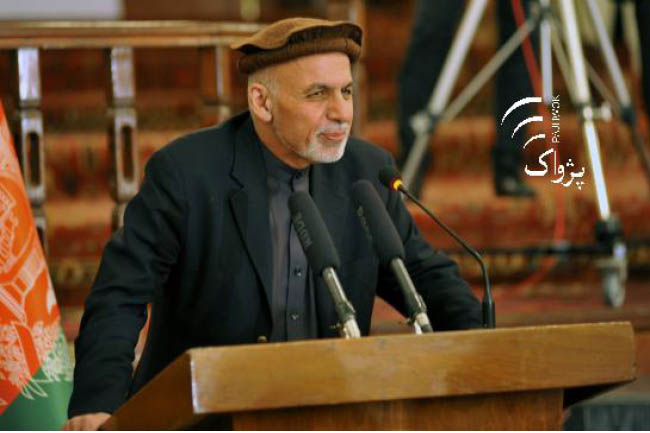In a letter to President Ashraf Ghani, the New York-based rights advocacy group Human Rights Watch has urged the Afghan government to take measures to end the dominant culture of impunity in the country. The top international rights group has said in the letter that impunity is a prevalent culture in Afghanistan, and has existed since long ago. Human Rights Watch has argued that impunity for those in Afghanistan who commit crimes is a violation of human rights, adding that perpetrators of violence and crimes are rarely prosecuted and justice are not provided for the victims. Human Rights Watch added that Afghanistan must put an end to the culture of impunity and pave the way for operation of the International Criminal Court in the country.
The call from the top international rights organization comes at a time when cases of violation of human rights remain rife in Afghanistan with many anti- and pro-government armed groups operating across the country. This is in fact a wake-up call on the Afghan government to do more to impose law and order and prevent irresponsible groups and individuals commit crimes while enjoying immunity for persecution. The Afghan government joined the ICC in October 2003, but so far no action taken to carry out its obligations as a member of the court. Human Rights Watch has added that membership of the Afghan government to the ICC was a hope to promote law and order and rule of law would replace chaos and lawlessness.
Promoting rule of law is a major test for efficiency and even sustainability of the government of Afghanistan. And rule of law would be incomplete if the government fails to end the prevalent culture of impunity and bring the criminals and perpetrators of violations of human rights to justice. Implementing justice and ending culture of impunity from persecution has undoubtedly gone into a marginal task in Afghanistan as the government’s priority is dealing with the deteriorating security and the resurgence of the militant groups along with the country’s economic and political challenges. Despite the rhetoric of the Afghan officials over rule of law and order, there has been little done by the government to help promotion of justice and rule of law in the country.
NUG is far from being able to bring the perpetrators of violence and human rights crimes – most notably the so-called powerful – to justice and restore rights of the victims. Violence occurs on daily basis in the country not only by anti-government groups but the very people who are supposed to make or enforce laws and implement those laws. Powerful warlords and militiamen are not the only ones who commit day-to-day violence against ordinary citizens and others but also government officials and lawmakers refuse to abide by laws and commit violent crimes with immunity. This has rendered Afghanistan as a society where lawlessness, chaos, violence threats are rife and those who means of power and authority continue to commit crimes.
The key factors behind the failure of the Afghan government to promote rule of law and end the culture of impunity are widespread corruption, misuse of authority by government officials, government’s reliance on the influential groups and figures who have a role in past wars, presence of groups and individuals within the government who had or still have armed wings or armed loyalists. However, the biggest factor is the weak governance and the state’s lack of control across the country to impose law and order and bring the perpetrators to justice. The Taliban insurgency will continue to remain the most single important factor failing the Afghan government to impose law and order, strengthen law enforcement agencies, implement justice and end culture of immunity for the influential people who have means of power and authority in the state.
The government’s reliance on the influential mujahedin groups who had their roles in the past wars and have considerable influence over the government now undermined the efforts to promote rule of law and end the culture of lawlessness in the country. Struggling to establish and extend his control, former president Hamid Karzai remained heavily reliant on former mujahedin and the so-called jihadi leaders. From the very beginning, he founded the basis for some sort of power-sharing with the jihadi leaders by appointing influential members of the former jihadi groups to key ministerial posts in the government. This prevented Karzai from decreasing the influence and power of the mujahedin in the government despite his preference to run the administration with the help of Western-backed technocrats.
Many of the jihadi parties and jihadi figures still have considerable influence in local administrations and in the government in Kabul. Many of them even have maintained their armed wings or circles of loyalists who are ready to fight for them. This has failed the government to extend the government’s authority and power across the country and impose rule of law against those who refuse to abide by law and continue to use their militias. The government must act to curb the power of those influential figures and end to the state of operation of states within the state.
It is important to end the parallel authorities that are long being tolerated namely influence of warlords and politicians who have had important roles in the past wars. The government should deprive them from their power bases by considering just shares of political power for the ethnic groups in the country.
On the other hand, corruption would remain a major challenge to the government’s efforts to promote governance and extend control over all aspects of administering the country. In addition, empowerment of law enforcement agencies such as the courts and police force would be the key for Afghanistan’s efforts to promote rule of law. The Afghan government needs to pursue bold plans on bringing reforms to police force and the country’s judicial system.
Home » Opinion » Ending the Prevalent Culture of Impunity
Ending the Prevalent Culture of Impunity
| Abdul Ahad Bahrami

